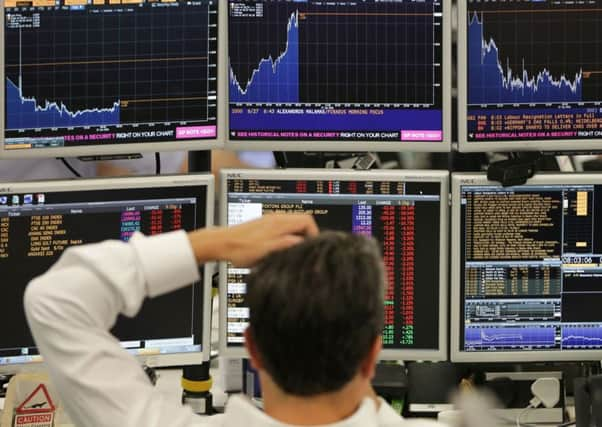Pound falls but shares higher after election shock
This article contains affiliate links. We may earn a small commission on items purchased through this article, but that does not affect our editorial judgement.


London’s top flight index was trading up about 44 points at 7,494 as markets opened and traders digested news that Theresa May’s Conservatives have fallen short of an overall Commons majority, resulting in a hung parliament.
Sterling also plummeted off the back of the result and suggestions that May will not stand down as Prime Minister, with the pound trading 2 per cent down against the dollar at $1.27. Against the euro, the pound also fell more than 1.5 per cent to €1.13.
• READ MORE: General election news
Advertisement
Hide AdAdvertisement
Hide AdThe slump in sterling is boon for multinational companies listed on the FTSE 100, as many tend to benefit from earnings in currencies that are stronger than the pound.
But the FTSE 250, a better barometer of UK sentiment, was down 167 points, or almost 0.9 per cent, at 19,576.
Colin McLean, managing director of Edinburgh-based SVM Asset Management, said: “If anything can be taken from a confused election result, it is that the electorate does not want a hard Brexit. This may already be reflected in the calmness with which investors approached the election.
“Business and consumer confidence has been resilient. The pound has sold off overnight and could see a further modest fall, giving up its rally this year. The weak result for the SNP in Scotland undermines the momentum for another independence vote.
“Investors usually pay too much attention to politics – elections reinforce the notion that governments can control the direction of the economy. In practice, business confidence is not so easily directed.”
Among the FTSE 100’s biggest risers were miner Fresnillo, fashion firm Burberry and drinks giant Diageo, but shares in housebuilders Barratt, Persimmon and Taylor Wimpey – which are more domestically focused – fell in morning trading, as did Barclays, Lloyds Banking Group and Royal Bank of Scotland.
Jason Hollands, managing director of investment management group Tilney, said: “In a night of high political drama, voters have delivered a heavy blow to Theresa May whose goal in calling the election of achieving an enlarged mandate ahead of the Brexit negotiations has backfired disastrously.
Advertisement
Hide AdAdvertisement
Hide Ad“From an investment perspective, a hung parliament is a market-unfriendly outcome as it creates more uncertainty in the near term – something markets hate. Even assuming the Conservatives can cobble together enough support from Northern Ireland’s unionist parties to form an administration, it is unclear whether a seriously wounded Mrs May can survive the ferocious backlash in her party.”
He added: “As we saw in the immediate aftermath of the EU referendum, it is usually best to let the dust settle on the initial market reactions to political events such as this rather than act hastily. So, for now, the best course of action is probably to sit tight and assume the brace position as some potentially volatile days are ahead for markets as well as UK politics.”
Markets had priced in a healthy Conservative majority, giving May free rein to take charge of Brexit negotiations unhindered.
However, others believe that a hung parliament increases the likelihood of a softer Brexit, which could be supporting the pound and preventing it going into freefall.
Kathleen Brooks, research director at City Index, said: “Perhaps the market is looking at this result as a vote for a softer Brexit, which could boost the pound in the long run.”
SVM’s Anderson added: “A barely workable Conservative majority will certainly weaken Britain’s hand in Brexit negotiations and may delay the start of talks this month.”